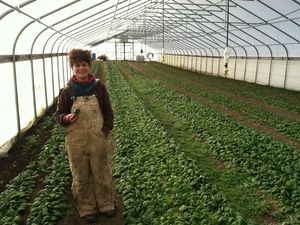Farmer Interview : Evangeline Sarat talks Living Wages
 Sweetland Farm, in Trumansburg, NY has been in operation for 10 years. In 2015 owner/farmer Evangeline Sarat decided to start paying her employees a living wage. Groundswell Director Elizabeth Gabriel sat down with Evangeline to talk about how she came to the decision to offer living wages, and how she is making it work on her farm.
Sweetland Farm, in Trumansburg, NY has been in operation for 10 years. In 2015 owner/farmer Evangeline Sarat decided to start paying her employees a living wage. Groundswell Director Elizabeth Gabriel sat down with Evangeline to talk about how she came to the decision to offer living wages, and how she is making it work on her farm.
EG: How did your decision to pay a living wage come about?
ES: In 2014 I began running the farm as a sole proprietor. In that year we offered normal pay. Being an only manager, I was able to make a decent salary (around a living wage), pay my loans and build equity. Plus, being a single mom, I prioritized my relationship with my kids over the farm. So I would stop farming when the kids got off the bus, the workers would still be working. That was all possible because of the farm workers.
I’ve been going to meditation retreats and developing spirituality practice. As a result, I started being very aware of this fact, that I was living this way, and my employees were not. One day the idea came to me (to pay living wages) and I couldn’t see anyway not to do it, even though I knew it was very risky.
EG: I’m sure many farmers in our area have thought about how to pay their employees living wages. How did you make it work, financially?
ES: First, I raised the price of our CSA (2 person share) by $60-100 (sliding scale). Then, I decreased the season by 3 weeks. That was healthier for everyone. For me, my employees, the farmland. I felt like this was a reasonable request of the CSA members – asking them to support a fair community food system. I didn’t run the exact numbers, but with the new wage in place, I figured I would need 300 CSA members paying about $675 per share to make the farm run as it was. I also wrote a letter to CSA members explaining the goal of providing a living wage for my employees. I first offered it to the employees who worked here for a year (2 workers) and then by November everyone got a living wage (4 workers). It was terrifying. I didn’t know if we would run out of money or not.
EG: So what was the response? How did everyone take it?
ES: We lost some of our CSA Membership, though nobody said it was because of the price increase. (Many stated it was our location.) Members seemed to understand the concept, but some also thought that because the cost of the share increased so would the value of what was included.
For my employees, I can see a significant change in their lifestyle and ability to live comfortably from month to month. It is definitely impacting their quality of life. And I think this opens the farm work to being an option for people with less privilege.
EG: Since you have done it, what would you say to other farmers contemplating increasing wages for their employees?
ES: It’s a risk. So is farming. I don’t feel like it’s something that if you don’t do, you’re not being moral. I get why people can’t do it. But I was willing to take the consequences of leaving the farm if I couldn’t make it work. I do think it would be really cool to see other CSA’s jump to Living Wage and all CSA’s increase their prices. Everybody might lose a few members, but it could be an overall success for the CSA model.
